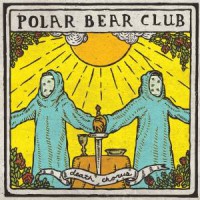Well over a year after this record was released, much of the conversation around this band continues to revolve around one subject: Jimmy Stadt’s voice. Polar Bear Club’s fan base was heavily grounded in Jimmy’s gruffly melodic roar. He toed the line between singing and screaming, and it made Polar Bear Club’s first records emotive powerhouses. His very public vocal deterioration and the subsequent sleeker vocal approach on Death Chorus resulted in a seemingly big shift in sound: some were supportive, but for many, this marked the end of the band’s appeal. I’ve got friends who maintain they can’t even give this record a chance for that reason alone.
I will say this: yes, the vocal change is jarring. Even more so if you listen to Death Chorus immediately after any earlier release. But the change does not diminish the merit of Polar Bear Club’s greatest strength: the songwriting duo of Stadt and guitarist Chris Browne. Browne’s distinctive, but melodic and accessible guitar work has always seemed to be built perfectly for the catchy hooks and heartfelt lyricism of Stadt. On this record, this relationship is just as strong.
The band continues its formula of pop-punk fueled post-hardcore, with an even greater emphasis on catchy lead guitar lines and big choruses. “When We Were College Kids†is a nostalgic rocker with plenty of “whoa-ohs†to boot. The up-tempo “For Show†is lyrically ambiguous, but the emotional resonance remains. The same can be said for “Chicago Springâ€, “Graph Paper Glory Daysâ€, and “Twang (Blister To Burn)â€, all impassioned and heavy, despite Stadt’s cleaner singing approach.
“Siouxsie Jean†is the only real stinker of the album. It’s a sincere ballad, but it lacks the goofy self-awareness of the band’s previous soft tracks like “Drifting Thingâ€. It ends up a little too schmaltzy and loses some of the album’s momentum. The album’s two singles, “Blood Balloon†and “WLWYCDâ€, aren’t its strongest either, replacing their unique sound with an increase in blander pop-punk elements. Nonetheless, the choruses of both are still astoundingly huge and earworm catchy, and the lyrics are full of Stadt’s cheeky earnestness.
This is certainly not Polar Bear Club’s best effort (I’d personally give that distinction to Clash Battle Guilt Pride). It’s not the travesty that some have made it out to be, either. It’s a solid poppy post-hardcore album, full of plenty of sing-alongs that rival much of the band’s previous work. Ultimately, it signals a shift, but not a loss, in Polar Bear Club’s legacy.
